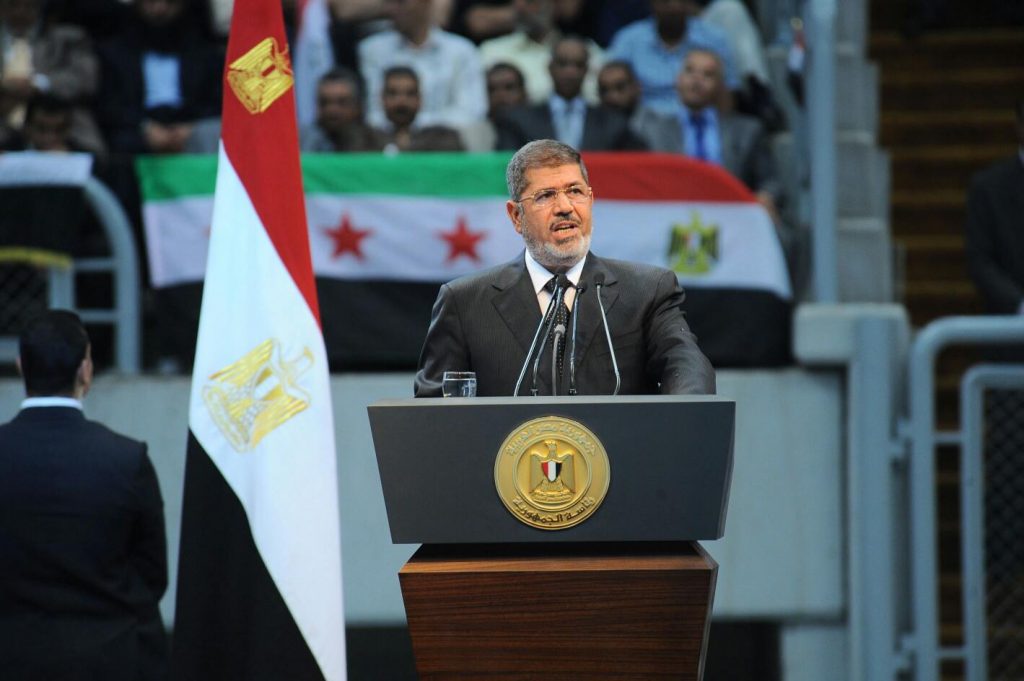
Egypt’s road to the current crisis has been, in part, shaped by an understated yet unhealthy obsession on the part of Egyptian political groups in scanning the international terrain for allies to bolster domestic positions and fuel their narratives.
While many Egyptians are proud to have exported Tahrir Square-styled civil disobedience to rest of the world, it is not always a one way street.
Egypt’s political groups and movements pick up certain international signals and cues allowing them to frame their activities to their supporters as part of a universal necessity and embed themselves in a grandiose narrative to which they are, somehow, central.
The 2012 Gaza-Israel conflict was a key moment in this process in which President Mohamed Morsi’s brokering of a ceasefire between Hamas and Israel resulted in praise lavished on him by President Barack Obama and the Western press. Morsi interpreted this as a green light for a significant power grab, issuing the November 2011 constitutional declaration, which in turn ensured that a highly flawed constitution was rammed through. Seen as having satisfied the international norms of acceptance, the Brotherhood agenda came out in full force, albeit recklessly.
The violent protests, however, in November and December sealed the beginning of the end of Morsi and the Brotherhood.
Ultimately it was Morsi’s foreign policy that undermined the Brotherhood platform. The flooding of the tunnels in Gaza in February, cutting off a lifeline for the Palestinians, did not bode well for Morsi. Remembering the Palestinian cause was the eternal redline for Pan-Arab and Pan-Islamist causes who frequently employ the Palestinian card to increase their standing. The one issue the Brothrhood distinguished themselves in from Mubarak and how they would address it still took on a security dimension.
Morsi’s bungling foreign policy missteps were quick to pile up. The sight of a president playing the role of an unsuccessful international panhandler, seeking loans, and perceiving him and his group as subject to the whims of Qatar, left Egyptians despondent. An attempt to restore Egypt-Iran diplomatic relations sparked outrage among his own allies, with Salafist parties claiming that Iranian tourism would open the doors to the spread of Shiism in Egypt. Dragged out IMF negotiations prompted many to question how the Brotherhood-led government could entertain the idea of accepting a usurious loan, while simultaneously championing Sharia law. Ethiopia’s Grand Renaissance Dam, which Egypt argues will pose a geopolitical threat to its Nile water supply, was the latest in international and regional crises that Morsi’s government handled ineptly, responding with a mixture of obliviousness and gaffes.
But it was the final weeks leading up to the current crisis that international events contributed to a language of political entrenchment and set the stage of an existential-like battle.
While the Brotherhood was talking of following the Turkish model, Turks decided to follow the Tahrir model. Egypt’s revolutionary camp received a boost in preparation for their June 30 campaign following popular protests taking place in Taksim and other Turkish cities. Egyptians watched Turkey with a sense of nostalgia, paying close attention to events unfolding to their north. Turkey, a non-Arab country, was highly discussed and images of the Egyptian flag planted in the middle of Turkey’s squares were widely circulated on social media. When the streets of Turkey exploded on May 28, Egyptian political groups voiced their support for their Turkish counterparts, denouncing the Turkish government.
Egypt’s fixation on Turkey reflected something deeper. The Brotherhood could always point across the Mediterranean to illustrate that Egypt’s broken economy would someday be as strong as that of Erodogan’s Islamist-led government. Khairat al-Shater, the Brotherhood’s deputy leader, styled himself as ‘Egypt’s Erdogan’ during his short-lived presidential campaign. It was for that very reason that Egypt’s revolutionaries took aim at Erdogan, a mixed case of the friend of my enemy is my enemy.
Instead of knocking the Brotherhood off-balance, the events in Turkey hardened their stances, perceiving that the regional Islamist project was under threat and the source of their international political legitimacy was at stake. Alaa Abul-Nasr, a leading member of al-Jama’a al-Islamiya’s political arm, the Construction and Development Party, referred to Turkish protests as an “uprising of alcoholics,” saying that Erdogan was the role-model for Egyptian Islamists.
Yet the pendulum would once again swing Morsi’s way when, in mid-June, Obama offered military support to Syria’s rebels. Soon after, at Morsi’s behest, Islamists rallied at the Cairo Stadium, espousing Jihad, in the quiet presence of Egypt’s president. Up until then, much of the Egyptian public was relatively united behind the Syrian uprising. Yet Morsi inadvertently introduced the anti-Shia sectarian element into official policy. Not surprisingly, the TV and district level Salafist sheikhs took their cues to further ramp up anti-Shiite rhetoric that contributed to the toxic environment that saw the most violent attack in recent history on Egypt’s Shias. Four Egyptian Shias were lynched a week later.
Finally, the royal succession of the new Qatari emir, a much more pro-Muslim Brotherhood figure, was well received by the Brotherhood. If Morsi’s government was ever willing to compromise, they now may have felt an extra reason or two not to, in light of the past month’s events.
Not to downplay Egyptian grievances driven by political and economic needs, but international events do shape the nuances, timing, and discourse employed by Egypt’s political groups.
The revolution’s rally cry was, and still is, bread, freedom and dignity. Surprisingly, the dignity element often gets neglected in the analysis only because it is not easily measurable yet it is intricately tied to how Egypt relates to the world and vice-versa. With millions protesting and reinvigorating the revolutionary momentum, Egypt may just have something else to return in kind to the rest of the world.
Amro Ali is a Middle East analyst and PhD scholar at the Department of Government and International Affairs, University of Sydney. Follow him on Twitter @_amroali and view his blog at www.amroali.com.
Photo: Egypt Presidency
Image: Morsi%20Syria_0.jpg
